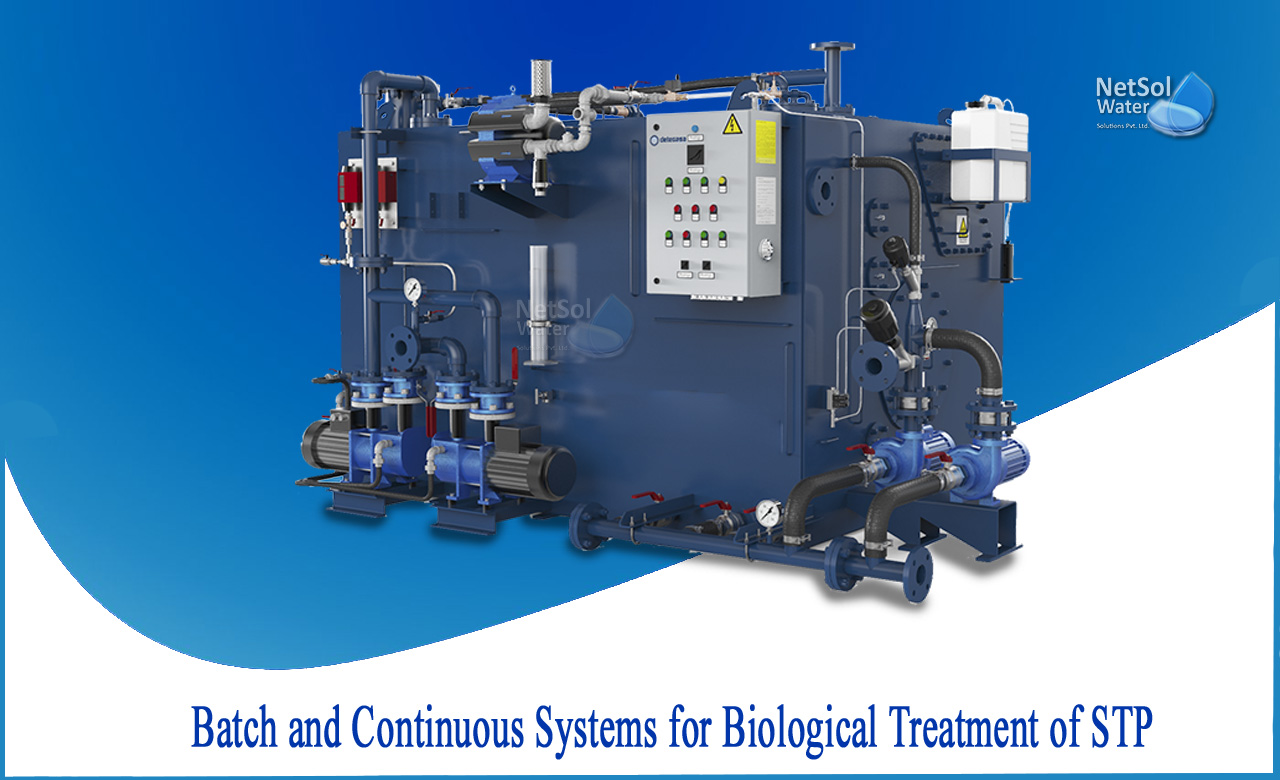What is the objective of Biological Treatment?
The objective of the biological treatment of wastewater is to remove organic matter present in soluble and colloidal form or to remove nutrients such as nitrogen and phosphorous from the wastewater.
For the conversion of the colloidal and dissolved carbonaceous organic matter into various gases, microorganisms are used. Cell tissue with specific gravity greater than water can be removed in settling tank. Complete wastewater treatment cannot be achieved unless the cell tissues get removed. Biological removal of degradable organics involves a series of steps including mass transfer, adsorption, absorption and biochemical reactions.
Stabilization of organic substances by microorganisms in a controlled environment of biological treatment systems is accomplished by two distinct metabolic processes:
a) Respiration also called as catabolism, and
b) Synthesis also called as anabolism.
What are the principles of Biological Wastewater Treatment?
Under suitable environmental conditions, the soluble organic substances of the wastewater are destroyed by biological oxidation; part of it is oxidized while the remaining is converted into biological mass, in the biological reactors. The end products of the metabolisms are either a liquid or gas. The synthesized biological mass flocculates and can beeasily separated out in clarifiers.
The biological treatment plant generally consists of -
(1) A biological reactor, and
(2) A sedimentation tank for the removal of produced biomass called as sludge.
The growth of microorganisms and the rate at which the substrate will be consumed with respect to time will depend on the type of the reactor used and environmental conditions.
Wastewater treatment processes can be represented either as batch process and continuous process:
1: Batch Process
During fresh commissioning of the reactor, if in case the microorganisms inoculated in the reactor do not adaptto the type of wastewater being treated, there can be some lag phase.
During this phase there will be some lag before the substrate is being accepted by the microorganisms. In a batch process, volume of wastewater is first collected and then treated and discharged.
Log growth phase:It represents the earliest stage of bacterial growth cycle in which substrate is adequate and rate of metabolism depends on the ability of microorganisms to utilize the substrate and growth conditions which affects the frequency of cell division.
Declining growth phase: The rate of metabolism and growth rate of microorganisms’ decreases due to limited supply of substrate. This condition is referred to as substrate limited growth condition where substrate available is not enough to support maximum growth rate of microorganisms.
Stationary phase:The phase due to growth limiting factor where the bacterial growth rate and decay rate are same, so there will be no net increase or decrease in mass of microorganisms, is referred to as stationary phase.
Endogenous growth phase: The microorganisms oxidize their own protoplasm needed for endogenous respiration. Thereby their number and mass gets reduced. This could be due to lack of nutrients, temperature or other conditions.
2: Continuous System
In continuous system,wastewater is continuously added, treated and discharged.
‘Food to Microorganism” ratio or (F/M) ratio is the factor for controlling the rate of metabolism.
>For low F/M ratio, food available is lower hence, it is endogenous growth of microorganisms.
>For high F/M ratio, food available is abundant; hence the growth phase is log growth phase.
>For in between F/M ratio, the growth rate will be declined growth phase.
Typically the biological reactors are operated at declining growth phase or endogenous growth phase with sufficient F/M ratio so that the microorganisms mass remains at least constant, and does not get depleted.
The sludge produced at log phase has very poor settling characteristics and the sludge produced in the endogenous phase has better settling properties and settles well and is more stable.
Choosing the Most Appropriate Wastewater or sewage Treatment System!
When selecting a system, there is a lot to consider, so it is critical to do some research.
An ideal system is one that will withstand the test of time while requiring minimal initial and ongoing costs. At Netsol Water Solutions, our sewage treatment systems have proven to withstand the test of time while remaining very affordable.
It goes without saying that a system must meet current public and environmental health and safety standards and regulations. Our sewage treatment systems are built to the highest standards and have the least amount of environmental impact.
Netsol Water will be able to provide the most essential wastewater treatment system in order to deliver the most appropriate and cost-effective treatment.
Netsol Water is Greater Noida-based leading water & wastewater treatment plant manufacturer. We are industry's most demanding company based on client review and work quality. We are known as best commercial RO plant manufacturers, industrial RO plant manufacturer, sewage treatment plant manufacturer, Water Softener Plant Manufacturers and effluent treatment plant manufacturers. Apart from this 24x7 customer support is our USP. Call on +91-9650608473, or write us at enquiry@netsolwater.com for any support, inquiry or product-purchase related query.



